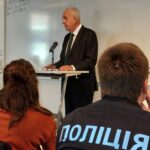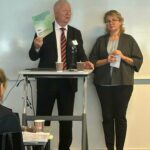Aleksander Kwasniewski, former President of Poland, Chair of the ECECACD, and Commissioner of the GCDP, Professor Kazatchkine, Special Advisor to the WHO Office for Europe, Commissioner of the GSDP and ECECACD, Volodymyr Tymoshenko, General of Security service of Ukraine, Commissioner of the ECECACD highlighted the EECA region perspectives at the the European Conference on Law Enforcement and Public Health that is taking place in Umeå, Sweden, 21-24 May 2023
President Kwasniewski at his oration at the opening ceremony of the conference has called for the decriminalization of drug use and possession and for alternatives to punishment for low-level non-violent stakeholders of the illegal drug market, including trade and production.
Mr. President also presented a recently published “Guiding Principles towards effective and humane drug policies in Eastern and Central Europe and Central Asia”, which provides for eight (8) key founding principles and eleven (11) priority directions for action to promote more efficient and humane drug policies in the region.
The eight principles are as follows:
1) Base drug policies on evidence;
2) Prioritize people’s and public health;
3) Promote human rights in drug policy;
4) End criminalization of drug use and possession;
5) Reduce and aim to end incarceration for drug offences;
6) Ensure access to evidence-based treatment for drug dependence;
7) Ensure access to controlled substances for medical purposes;
8) Ensure participation of civil society and affected people in policy making.
President Kwasniewski acknowledged Ukraine—the country that demonstrates unbelievable bravery in defending its freedom and values, but also the country that continues reforms in many spheres. He presented some cases from Ukraine, which demonstrate good examples of cooperation between police and public health sector and pointed out that police, as a first-line public service would be well situated to facilitate access to harm reduction services through referral or diversion programs.
We can make things better, TOGETHER, we can reform policies for drugs that are more humane, more reflective of what is effectively needed – and move past the embedded taboo and stigma.”—President Kwasniewski concluded.
Professor Michel Kazatchkine pointed out to one of the most challenged recommendation of the Global Commission: to move from prohibition to legal regulation of drugs. Commissioners have called for the legal regulation of all currently illegal drugs, beginning with cannabis, and continuing with coca leaf and (opium) poppy. Legal regulation is creating a supply chain with strict controls for potency, quality and access. Regulation means protecting the health and safety of the end consumer. To us, drug regulation is a means to strengthen institutions, just as drug prohibition has weakened them. We believe that the process of regulation should be evidence-based, and guided by the principles of protecting human rights, health and sustainable development.
Professor also emphasized that progress toward more evidence-based and humane drug policies should not wait for difficult solutions to be agreed upon at global level.
In the conceptual frame of harm reduction which I discussed, progress can start at home, at country, at province, at city level where policy-makers, law enforcement, professionals from the health and social sectors and civil society, can introduce pioneering changes. Much can be achieved by means of a “bottom-up” rather than a “top-down” approach.”—concluded Professor.
General Volodymyr Tymoshenko shared his professional experience and a significant transformation of his understanding and approach to drugs issues. While heading the State Service on Drug Control in Ukraine (2010-2013) he had to work on and put lots of efforts to change the legislation that was previously adopted with his support. He shared his transformation from being one of the most tough law enforcement who fought trans-national drug trafficking and corruption to a decision-maker who implemented a balanced approach to drugs in Ukraine.
President Aleksander Kwasniewski met with President Atifete Jahjaga
President of the Republic of Kosovo (2011 – 2016). Political leaders from the region discussed the current situation in the EECA region, shared words of support to Ukraine as well as agreed to consider an opportunity to collaborate and work together on drug policy reforms in the region.



